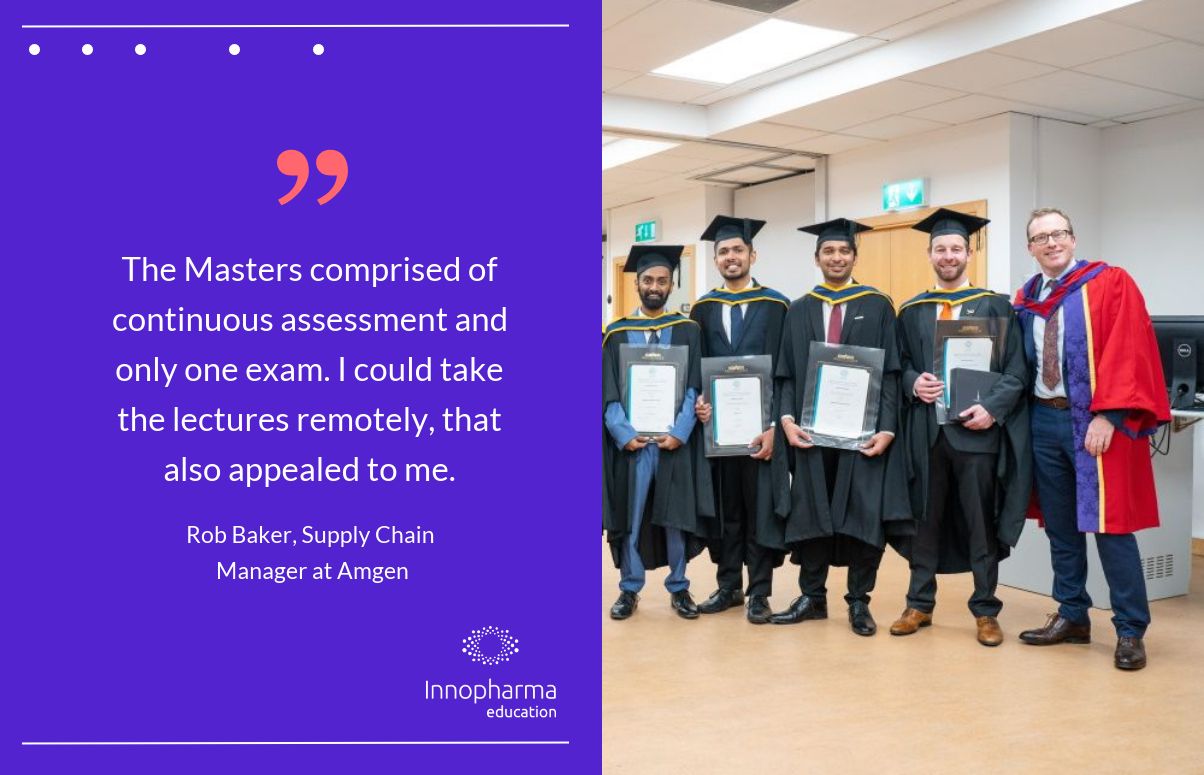Graduate Interview: Rob Baker

Rob Baker has a background in Electrical Engineering. Although he had been working in the pharmaceutical industry for about 15 years, he had not studied for about 20 years and felt he didn’t have the full knowledge and skills of the industry and was interested in learning more. He knew about the aspects he was working on but wanted to get a deeper understanding of the overall end-end business. He came across our MSc in Pharmaceutical Business & Technology accredited by Griffith College Dublin and found it to be a perfect match to what he was looking for. He was also recommended the programme by work colleagues so he knew it would be a good course to advance his skills in the Pharmaceutical industry.
Currently, Rob is working in Amgen as a Supply Chain Manager. He had spent many years in automation & also in project management and moved into information systems and business analyst. After graduating he moved into a Supply Chain Team.
What did you like about the Masters?
“I liked the examination part of the masters, the fact it comprised of mainly continuous assessment with only one exam. There are not many others like it. The blended learning aspect also appealed to me as lecturers could be taken remotely, at a time that suited. During the Masters, the lecturers were very good and interactive. These were two huge positive factors when I was making the decision to apply for the MSc in Pharmaceutical Business & Technology. Also, the company I was working for at the time, funded the programme which is a great help.”
What does your current role involve?
I manage a team for the European office for contract manufacturing in Supply Chain. Globally, on a monthly basis, we look at the Sales & Marketing forecast figures and decide how many products will be needed in each region. We do the planning all the way from the back end to how many batches we need to make in our different manufacturing sites around Europe. We then agree with a forecast with the contract manufacturing site to make sure they have all the relevant materials to make the products and then when products are made, we coordinate the shipment to each destination. It is a very interesting role; you need to be very organised and on top of the duties. It is interesting with the new clinical trials coming into play. Depending on the results from the clinical trials you see your volumes change so it is always an exciting space.
Did you find the course content relevant to your current role?
“Yes, it was all relevant. I found the Operational Excellence & Science of Innovation module in particular, very relevant to Supply Chain, where I am currently working. Like any programme that you study, the level of effort that you put into the assignments dictates the amount of information that you learn and takeaway.”
What were the modules that stood out to you?
“The Operational Excellence & Science of Innovation module was very good. The Technical Transfer and Clinical Trials was very beneficial to me as it wasn’t something I had been involved in before, so I learnt a lot from these modules. The Production Systems, Validation & Quality Management Systems elements of that module were excellent.”
What’s your view on the future of Pharma industry?
“The industry is changing rapidly. It is moving from solid dose to biologics and single-use technology to continuous manufacturing. However, some of the biologics are actually moving back to solid dose such as cancer treatments that are coming out recently which is interesting to see. For example, Amgen is starting to manufacture solid oral dose which is something that they have never done before. But this is something where there are new products that are going through clinical trials now that are KRAS restrictors. So, it is a new cancer treatment that decloaks the cancer cells to allow the immune system to fight them. They are going to be in tablet form. So yes, it is constantly changing due to technology.
Going back to the Masters, the module on 21st Century trends is very important. And it is important to keep that updated and relevant especially when the industry is constantly changing.”
In your opinion, what will be the critical skills in pharma in the coming years?
It depends on what area you are looking at. But understanding the end-end business is always going to be an advantage. I think flexibility within your skillset is also important as the industry is rapidly changing. Technical skills are always in demand. Having an efficient and focused data analytics team is a huge benefit as we move into the future.
Would you recommend the MSc in Pharmaceutical Business & Technology?
Yes, I have already done. There are about six people from Amgen who have done the course.
Find out more about our online MSc in Pharmaceutical Business & Technology here.



















